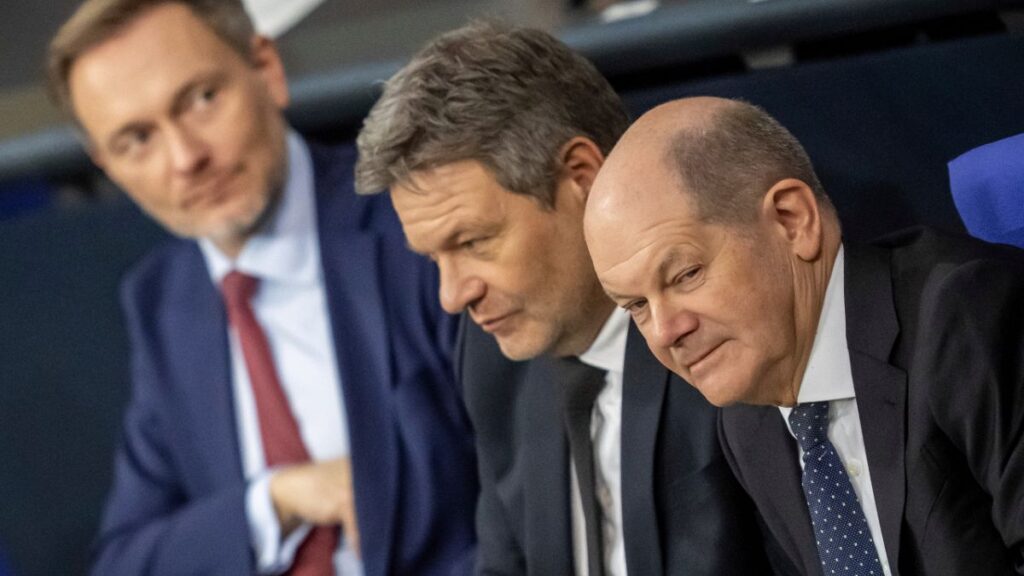Other European countries may have to step up their efforts to compensate for Germany’s decision to cut military aid to Ukraine, defence researcher Alain de Neve warns in an interview with Euronews.
Germany is set to allocate four billion euros in the 2025 budget for Ukraine. This figure is almost half of the 7.5 billion euros allocated by Berlin this year.
The budget proposal that the coalition government finalized on Friday after lengthy negotiations must now be examined by the German parliament. If this reduction is confirmed, researcher Alain de Neve at the Royal Military Academy of Belgium warns that the impact will not be negligible.
“It is clear that this will have an impact, especially in financial terms. As for concrete military aid in terms of equipment provided, we can see that Poland is ahead of Germany in this regard. It is clear that it is Ukraine’s neighbouring countries that are contributing the most (to this aid). It is worth noting the special case of the United Kingdom, which also contributes much more than France, Spain or Italy.” he explains to Euronews.
Since 2022, theThe EU and its member states have given 38 billion eurosmilitary aid, including 28 billion euros from Germany.
German aid is mainly financial, to which must be added five billion euros of weapons sent by its armed forces.
Frozen Russian assets and the US position
The G7, which brings together the world’s seven largest economies, is discussing the possibility of using part of the $300 billionRussian assets frozen to supply military equipment to Ukraine.
But the political and technical details that will be discussed by the leaders of Canada, France, Germany, Italy, Japan, the United Kingdom and the United States will not be easy to resolve, believes Alain de Neve.This could not really constitute a sustainable resource to support Ukrainians in their resistance against Russia.“.
“It should be noted that these approximately 300 billion dollars will ultimately have to be distributed among several countries. And it is at the G7 that the issue will be debated and negotiated. We do not yet know what envelope will be allocated to the different States. We do not even know if there will be an agreement to mobilize this reserve. And once again, this reserve will be a one-shot. It will not be a structural measure that can be implemented in the long term.” he adds.
Only the United States provides Ukraine with more military aid than Germany, but the US presidential election in November could change that. The current Democratic administration has promised to maintain this support, but Republican candidate Donald Trump could reverse course.
“The main danger that could exist is that a European reduction – even a limited one – in aid to Ukraine could be accompanied by a particularly notable reduction in aid from the United States if Donald Trump came to power.“, warns the analyst.
“The question is whether Europe can regain control in the current situation. It is very difficult to imagine. There will clearly be areas where Europe will not be able to compensate for the absence or reduction of American military and financial aid. Nevertheless, Europe has known for some time that the issue of the war between Ukraine and Russia is first and foremost a European issue.“, he continues.
Strengthening the defense industry
Aware of this fact, EU leaders decided last February to create a new mechanism for Ukraine, with 50 million euros – to be spent until 2027 – to also support the country’s recovery and the reforms it must undertake as a candidate for membership in the European project.
On the other hand, the Union understood that it had to invest more in its own defence industry in order to help Ukraine and to deter Russia from attacking any of its members, especially neighbouring countries.
“Europeans, in general, are between a rock and a hard place. On the one hand, there is the aid that must be provided to Ukraine to enable it, I would say, to resist Russian pressure. On the other hand, there is the need for European rearmament and more economic resources. Budgetary resources are, by definition, limited. So all European countries, in one way or another, in the coming months, in the coming years, are going to have to make choices that can sometimes be painful.“, underlines Alain de Neve.
To move forward on this issue, the President of the European Commission, Ursula von der Leyen, wants to create a portfolio dedicated to defence.
This new European Commissioner will be responsible for managing the first European defence industrial strategy to improve the EU’s preparedness and security.

